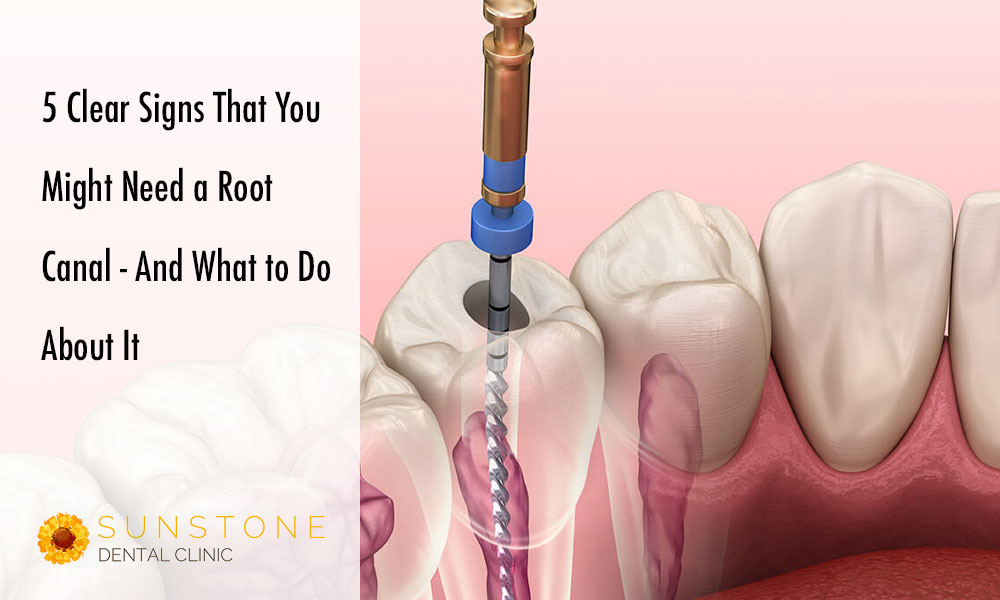5 Clear Signs That You Might Need a Root Canal – And What to Do About It

Are you dealing with persistent tooth pain or a throbbing sensation in your mouth? These could be signs that you might need a root canal. Root canals are a common procedure to treat infected or damaged tooth roots. Learn about five key signs that suggest you may need a root canal and what steps to take next.
What is a root canal?
A root canal is a common dental procedure to save a severely damaged or infected tooth by removing the pulp, which contains nerves and blood vessels. The dentist numbs the area, creates an opening in the tooth, and removes the infected pulp. The inside of the tooth is then cleaned, disinfected, and filled with gutta-percha to seal it. Finally, the tooth is restored with a filling or, in some cases, a dental crown to protect it and prevent future issues.
Signs that you might need a root canal
Here are some common signs that you might need a root canal:
- Persistent Tooth Pain: Throbbing, aching, or sharp pain in a specific tooth could indicate an infection or inflammation in the tooth’s pulp.
- Sensitivity to Hot or Cold: If your tooth is highly sensitive to hot or cold foods and drinks, it may signal a problem with the tooth’s pulp, especially if accompanied by pain or discomfort.
- Tooth Discoloration: A darkening or change in colour of the tooth could suggest an internal issue with the pulp, possibly along with other symptoms like pain or sensitivity.
- Swelling or Inflammation: Swelling or redness around the gum near a specific tooth could be a sign of an infection or inflammation in the pulp, often accompanied by discomfort.
- Pimple-Like Bump on the Gum: The presence of a bump, known as a “fistula,” on the gum near the affected tooth indicates the body’s attempt to drain an infection from the pulp and should be checked by a dentist.
Importance of early detection and treatment
Early detection and treatment of a potential root canal issue are essential for several reasons:
- Relieves Pain and Discomfort: Early detection can alleviate pain associated with a root canal issue.
- Prevents Infection Spread: It stops the infection from spreading to other parts of the mouth or body.
- Preserves the Tooth: Early treatment can save the affected tooth from further damage.
- Avoids Expensive Dental Work: Addressing the issue promptly helps prevent the need for more extensive and costly procedures.
- Protects Overall Health: Early intervention safeguards your overall health and can save money in the long run.
What to do if you suspect you need a root canal
If you suspect you might need a root canal, follow these steps:
- Schedule a Dentist Appointment: Don’t delay treatment, as it can worsen the infection or inflammation, leading to more serious complications.
- Undergo a Dental Examination: Your dentist will examine your teeth and gums, take X-rays, and may perform tests like tapping on the tooth or applying hot/cold stimuli to assess the issue.
- Learn About the Procedure: If a root canal is necessary, your dentist will explain the procedure, discuss the risks and benefits, and review any alternative treatments.
- Share Your Medical History: Be open with your dentist about your medical history and current medications to ensure the best care.
- Understand the Root Canal Process: The dentist will numb the area, access the pulp chamber, remove the infected tissue, clean the tooth, fill it with gutta-percha, and seal it with a filling.
- Follow Aftercare Instructions: Post-procedure, follow your dentist’s advice, which may include taking pain medication, avoiding certain foods or activities, and maintaining good oral hygiene.
- Attend Follow-Up Appointments: Ensure proper healing by attending follow-ups and addressing any concerns or complications with your dentist.
Take care of your dental health
It’s important to recognize signs that you might need a root canal, like persistent tooth pain, sensitivity, discoloration, swelling, or a bump on the gum. Getting treatment early can relieve discomfort, prevent complications, and protect your teeth and gums. Regular dental check-ups and good oral hygiene are also essential for keeping your smile healthy. Don’t wait—take care of your dental health now. To schedule an appointment, call Sunstone Dental Clinic at (604) 428-8722.
